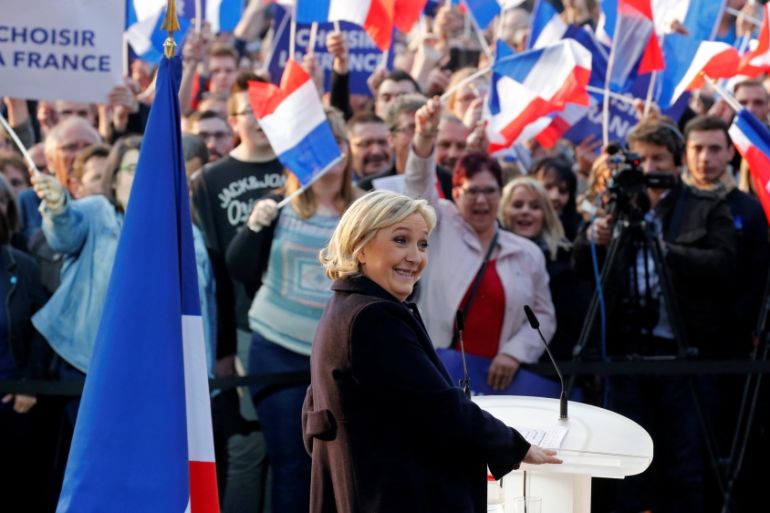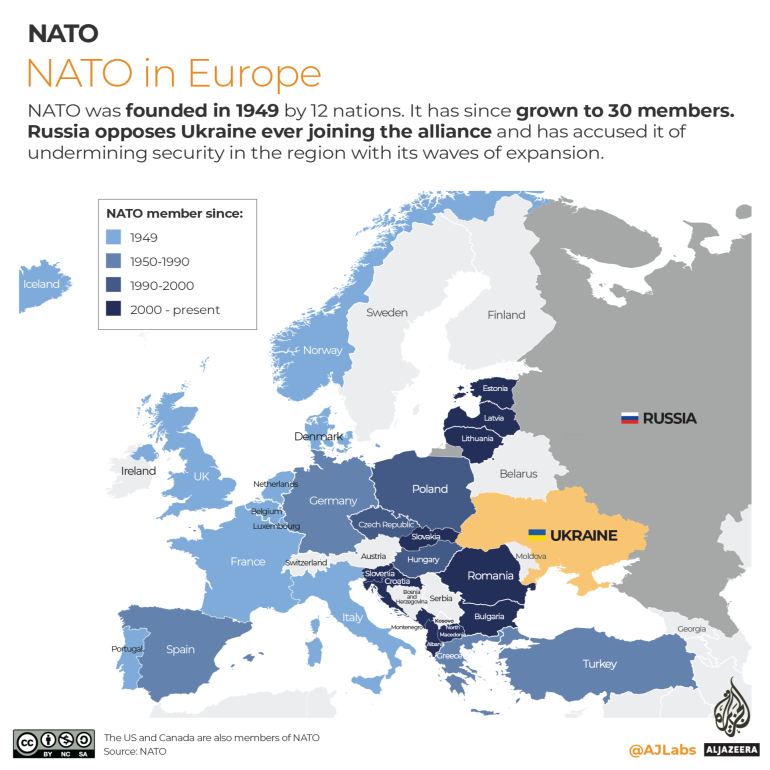France’s Le Pen backs ‘rapprochement’ between NATO and Russia
Far-right leader also reaffirms her intention to repeat France’s 1966 move of leaving NATO’s integrated military command, while still adhering to its key Article 5 on mutual protection.

France’s far-right leader Marine Le Pen backed closer ties between NATO and Russia, pledging if she won the presidency Paris would again leave the military command of the American-led alliance.
Le Pen, who on April 24 faces President Emmanuel Macron in a runoff vote, said there should be a “strategic rapprochement” between NATO and Russia once the war launched by Moscow against Ukraine ended.
Keep reading
list of 4 items‘Sense of fatigue’ as France prepares to choose next president
Election runoff an image of a polarised France
Who will become the next president of France?
“We must ask about the role of the alliance after the end of the Warsaw Pact,” the Moscow-led military alliance that grouped Soviet bloc nations, she told journalists.
A Le Pen victory would reverberate through Europe and across the Atlantic, installing a deep eurosceptic in the Elysee Palace who has long professed admiration for Russian President Vladimir Putin.
Le Pen has drawn criticism in the past for a shaky grasp of geopolitics, once asserting that Russia had not invaded Crimea in 2014.
The news conference, designed to present Le Pen as a credible figure on the global stage, was briefly interrupted by a protester brandishing a heart-shaped picture of Le Pen and Putin, who was quickly dragged away by security guards.
‘Strategic rapprochement’
Le Pen told international and French media she wanted to clear up “misunderstandings” about her foreign policy.
“France is not a middle nation but a big power that counts,” she said, launching a 30-minute monologue on France’s historical achievements before outlining differences with what she called the “chatty, sketchy and ill-informed” diplomacy of pro-European centrist Macron.
She said she had been misjudged in her previous expressions of esteem for Putin, saying she had only been defending French interests in her warm contacts with the Kremlin leader, including calls for an alliance with Moscow.
“As soon as the Russian-Ukrainian war is over and has been settled by a peace treaty, I will call for the implementation of a strategic rapprochement between NATO and Russia,” Le Pen said.
Le Pen emphasised better ties with Russia would also prevent Moscow from becoming too close to China, noting she was echoing an argument made by Macron in the past.
“This is in the interest of France and Europe but also I think the United States … which has no interest in seeing a close Sino-Russian relationship emerging,” Le Pen said.
She also reaffirmed her intention to repeat France’s 1966 move of leaving NATO’s integrated military command, while still adhering to its key Article 5 on mutual protection.
“I would place our troops neither under an integrated NATO command nor under a future European command,” she said, adding she refused any “subjection to an American protectorate”.

‘Brussels bureaucracy’
Le Pen also suggested she wanted more distance in relations with fellow European Union powerhouse Germany.
While supporting Franco-German friendship and asserting that French and German should replace English as the operating languages of European institutions, she warned “strategic differences” would mean a new way of working with Berlin.
She would put an end to Franco-German military cooperation, including future warplane and tank programmes.
“I would continue … reconciliation without following the Macron-Merkel model of French blindness towards Berlin,” she said, referring to the former longtime German chancellor.
On Europe, Le Pen made clear any “Frexit” along the lines of the United Kingdom’s exit from the European Union was not on her agenda.
But she argued French predictions that Brexit would prove “a cataclysm for the English” had not come true.
“The British got rid of the Brussels bureaucracy, which they could never bear, to move to an ambitious project of global Britain,” she said.
But she added, “This is not our project. We want to reform the EU from the inside.”